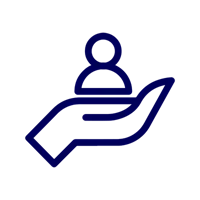
Sian Cleaver
Orion European Service Module Industrial Manager at Airbus Defence and Space
From the age of 5 I’ve always wanted to be an astronaut. This ambition has influenced every decision I’ve made throughout my education and career – I’ve always been working towards a job in the space industry!
About Sian...
Who am I?
"I am an Industrial Manager for the Orion European Service Module project. I grew up in the UK, but now lives and works in Germany because that's where the project she's working on is based. I've always had the dream of working in the space industry and is now making that a reality by contributing to NASA's Artemis missions to the Moon!I am very organised with a good eye for detail, and is also a good communicator which are both traits of a ‘Coordinator’. I also likes writing reports, and is very conscientious, which fit well with being a ‘Influencer’ type.I think I demonstrate the ‘Quality Controller’ role because I am honest with a sense of fairness. I will always speak up if something isn’t right or fair! I'm not afraid to challenge the status quo or to add my own opinions or ideas to a discussion."
What do I do?
"I am an Industrial Manager for the Orion European Service Module project. This is a project to build the service module of the Orion spacecraft that flies on NASA's Artemis missions to the Moon. It's being built in Germany by Airbus, the company I work for. An Industrial Manager is responsible for making sure that the spacecraft factory has everything needed to be able to put the spacecraft together - all the different equipment that flies on board and adequate resources etc. In a nutshell, I help to resolve any issues that might make the spacecraft build late, because it's very important that it's delivered on time.This is an office-based role that involves responding to emails, attending meetings and preparing reports and summaries to keep her customer the European Space Agency and NASA) updated on progress. I track the progress of actions using spreadsheets and data analysis. Sometimes I go to the 'cleanroom' where the spacecraft is being built to see the progress in real life. I typically work a 7 or 8 hour day. At the moment, I don't travel much with my job, but I did manage to make it to Florida to see the launch of Artemis I in 2022!I love the fact that I am contributing to the Artemis programme which will land the first woman on the Moon."
How did I get here?
"I studied Maths, Physics and Chemistry at A-Level and then studied Physics and Astronomy at Durham University, where I graduated with an MPhys. I then applied to the Airbus graduate scheme, and started working at Airbus Portsmouth a few months after graduation in 2012. As part of the graduate scheme, I was given the opportunity to do a six-month placement abroad in Bremen, Germany, and it is there that I saw first hand the cool things Airbus are doing in human spaceflight. I returned to the UK to work at Airbus Stevenage for a few years (mostly on science and exploration space missions), but when an opportunity came to work in human spaceflight in Bremen, I jumped at the chance and moved to Germany."
The life I live
"In my spare time, I enjoy flying, astronomy, scuba diving and travel. She also loves animals and has a hamster called Persephone.I actually gets lots of opportunities to travel with her job. My company is European, so she often travels to European countries to meet customers or suppliers. I will also sometimes work with an organisation a bit further afield, like NASA in the USA, and travel opportunities come with that too.I would one day love to apply to be an astronaut, but failing that I would just love to be working with astronauts in some capacity. The space industry is evolving a lot at the moment and I am excited for the opportunities in human spaceflight that are on the horizon."
My typical day
"I typically work a 7 or 8 hour day, starting at 08:00. My day consists of working at a computer in my office, replying to emails, checking up on progress and attending meetings. I get involved with any topic or issue that might affect the delivery date of the spacecraft I'm helping to build. Sometimes, equipment that needs to be integrated onto the spacecraft is late, and I help to resolve any issues or find workarounds that allow the spacecraft build to progress without delay. Sometimes there is a technical issue with a part and I work together with the technical experts to find a solution and implement it. My job is quite varied and changes often. I have a background in project scheduling so I work very closely with the schedulers for the spacecraft I'm building. Building something so complex requires working together with a lot of different people, each experts in their own area. When something needs changing in the schedule, it can take a lot of conversations to find the correct way forward!"
My qualifications
"I studied for an undergraduate Masters in Physics and Astronomy at Durham University. It was a four year course that was very academic, but also allowed opportunities to do practicals using the observatory telescopes."



